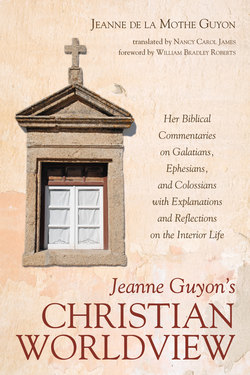Читать книгу Jeanne Guyon’s Christian Worldview - Jeanne de la Mothe Guyon - Страница 5
На сайте Литреса книга снята с продажи.
Foreword
ОглавлениеFrom her riveting book Standing in the Whirlwind, one discovers something of the harrowing details of Nancy James’s early ministry as an Episcopal priest.1 She learned first-hand that a faithful life entails suffering. Reading that memoir sheds light on why James might have been drawn to Guyon. This deeply faithful seventeenth-/eighteenth-century woman was subjected to grievous mistreatment at the hands of civil and religious authorities, including several years of imprisonment. Guyon’s voice is still prophetic today. While despots cling desperately to their authority, the prophet’s authority arises from integrity.
This volume is James’s tenth book on Madame Guyon, placing James clearly in the forefront of Guyon scholarship. One senses James’s ever-deepening wisdom in these cumulative studies, each new book building on the achievements of the last.
As with all effective translations, James’s rendering of Guyon reads as if English were the original language. No awkward syntax, clumsy constructions, or questionable word choices litter James’s treatment of Guyon’s text. It reads smoothly. Anyone who has attempted translating will attest that such a natural flow of language does not appear on its own, but is instead the result of meticulous work, trying this word and that, until the new language is as fluid as the original.
When Guyon labels her work “A prayerful guide” she lays bare her motive for writing it. She wants to impart the deep wisdom she has discovered in these three biblical letters. To call this “a devotional book” implies no condescension. If Guyon’s book were only a scholarly study, the reader would not encounter a phrase like, “O wonderful truth! How is it that all Christians do not comprehend this point?”2
The reader cannot understand Guyon or her writing without accepting Guyon’s passion. Indeed, passion is probably the most compelling aspect of these commentaries.
James finds no occasion for embarrassment in Guyon’s flights of spiritual ecstasy, but instead allows her to speak richly in her own voice. As a result, that voice comes across as precise and clear as if the reader were visiting with Guyon in her own time.
Galatians scholar J. Louis Martyn says that reading Paul’s letter to the Galatian churches is “like coming in on a play as the curtain is rising on the third or fourth act.”3 The plot is already thick, demonstrated in the opening lines, which tell us three things: 1) There is high drama here, because of the deep love and angry tension between Paul and this church. 2) There is a rich history between the Galatians and Paul. 3) A number of actors besides Paul and the Galatians have already appeared on stage, and understanding the book involves knowing their roles.
Guyon understands this drama intuitively, and responds to the text as if she knows the actors. Galatians 2:20 says, “It is no longer I who live, but it is Christ who lives in me. And the life I now live in the flesh I live by faith in the Son of God, who loved me and gave himself for me.” Guyon responds: “Now I live by faith in the Son of God. Jesus Christ lives in me and it is He who works in me. Jesus Christ leads and governs me. His life is my life. His Spirit communicates with me. He fills my soul with His Spirit and life. Therefore, I see nothing within or without except Jesus Christ who lives within me.”4 Guyon quotes the biblical texts in brief portions, then delves headlong into their meaning and application to daily life. Like the writers of the epistles, her life is centered in the person of Jesus, and this resonates in her testimony.
Accepting an authentic Pauline authorship of Ephesians (disputed among some scholars), and assuming that Paul was martyred in Rome in AD 63, then the letter was written in Rome in the years 61–63. If written in Cæsarea, then the date is two or three years earlier.5
Since Guyon begins with the assumption of Pauline authorship, one wants to read her book from that perspective.
We know little about the setting or date of Paul’s letter to the Colossians. What theological and practical matters gave rise to it? We can only speculate. The biblical book, nevertheless, contributes much to understanding Paul’s mind and pastoral ministry, and this makes Colossians fascinating reading. The letter presents the person of Jesus Christ as the answer to human questions about the cosmos.6
It is no wonder, then, that Madame Guyon was drawn to comment on Colossians, because her life was grounded in her relationship with Jesus. As she writes, we quickly begin to understand her utter devotion to Jesus as the source of wisdom and guidance.
In her commentary on these three biblical books, Guyon ushers us into her understanding of Scripture as rooted in a mystical relationship with God. The reader not only is instructed by Madame Guyon in matters spiritual but also enters into an intimate conversation about life in Christ. We witness her courage in bold responses to Scripture, applying it to everyday life for the believer.
Readers will find in this volume a source of knowledge and inspiration. One cannot help but be moved by Guyon’s direct, heart-centered, and passionate talk about living life with God as one’s companion. James’s rich translation of Guyon might indeed yield more spiritual companions.
The Rev. William Bradley Roberts, DMA.
Professor Church Music and Director of Chapel Music
Virginia Theological Seminary
Alexandria, VA
February 3, 2017
1. James, Standing in the Whirlwind.
2. Guyon, Commentaries, 46.
3. Martyn, Galatians, 13.
4. Guyon, Commentaries, 34.
5. Barth, Ephesians, 51.
6. Martin, Ephesians, 81.
